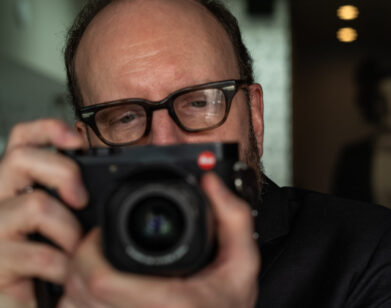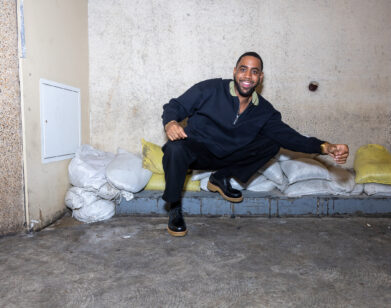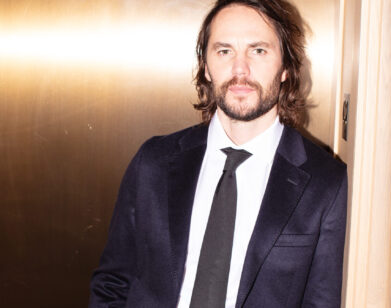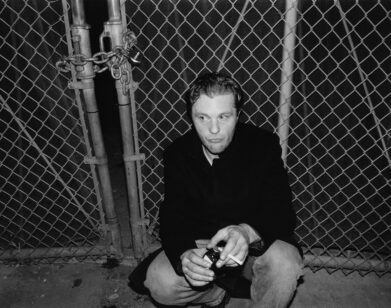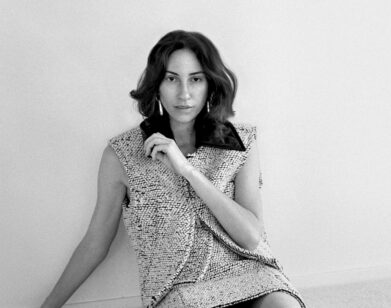History Lessons with Hannah Murray
HANNAH MURRAY IN LONDON, JULY 2017. PHOTOS: MATT HOLYOAK/KAYTE ELLIS AGENCY. STYLING: THOMAS DAVIS. HAIR: BEN JONES USING WINDLE AND MOODIE. MAKEUP: AKGUN MANISALI FOR THE LONDON STYLE AGENCY USING CHANEL. RETOUCHING: THE SHOEMAKER’S ELVES LONDON.
“I’m really, really proud it,” says Hannah Murray over the phone from Los Angeles. It’s the week of the Games of Thrones Season Seven premiere, but for now, we are discussing Murray’s new film, Detroit, directed by Kathryn Bigelow. Far removed from wildlings and dragons, Detroit is a powerful and painfully relevant retelling of a bloody July night at the Algiers Motel during the 1967 12th Street race riots. Acting alongside John Boyega, Will Poulter, Anthony Mackie, Jacob Latimore, Jack Reynor, and Kaitlyn Dever, Murray plays Julie Hysell, a real-life 18-year-old from Ohio visiting the Motor City. “I watched the film a few months ago now and I felt ill,” the British actor explains. “I had the same sense when I first read the script. The double injustice … it’s just sickening.”
Now 28, Murray’s first professional role was as Cassie Ainsworth, a wide-eyed anorexic with a penchant for saying “wow” in the British teen drama Skins. After taking a few years to study English at Cambridge, Murray has split her time between gritty indie movies like Bridgend and playing Gilly on Thrones. “I don’t think I am very strategic,” she says of her career. “I want to work with really talented people and I care about the writing.”
EMMA BROWN: How did you first hear about Detroit?
HANNAH MURRAY: I was in L.A. last year in April and I got sent to this audition for an untitled Kathryn Bigelow project. There was no script, but obviously Kathryn’s name is more than enough to make you excited about something. There were just scenes to read that were from Almost Famous and Boogie Nights. I went in with no idea of who the character was or what the project was about; I was told it was about the Detroit uprising, but I didn’t know what it was going to focus on. I didn’t know how old my character was supposed to be. I was able to meet Kathryn the day before I left L.A. and she was so lovely and really, really kind. I left the meeting thinking, “Well, that went really well, but I can’t imagine anything is going to come of it.” Then I got offered the job, which was amazing. I didn’t read the script until a few days before we started shooting, because it was very secretive—some of the members of the cast never saw the full script, still haven’t seen the full script. Kathryn quite likes to withhold information from actors so that they stay really fresh and feel really truthful and spontaneous.
BROWN: Your character, Julie, is based on a real, living person. Was that something you talked about after you got cast? Or did you only find out when you got the script?
MURRAY: When I met Kathryn she said that this character was based on a real person, and that the real Julie was involved and would be there during filming. I met Julie the day I arrived in Boston [for the shoot]. It was the very first thing I did, which was amazing. She was on set every day, and it was such an honor to spend time with her and get to know her. She was so generous with her time and sharing her memories, answering my questions. For me, it was about connecting with her on a human level. She was always my touchstone for why I was doing this, why I thought the story was important. It was really great to feel like I had her permission—we all had her permission—to tell her story. I’ve never known anything like it. It was a very different process from anything I’ve ever worked on.
BROWN: Was it initially difficult to talk to Julie about what had happened? Even if she is being very generous and open, it must have been a very traumatizing experience for her.
MURRAY: I was very sensitive to that fact and the questions I wanted to ask her were not about the traumatic elements of the script; I was more interested in who she was as a person before this happened. But I think she’s incredibly brave and very untraumatized as a human being. Kathryn had mentioned that before: “She’s amazing. She’s just so strong and there’s no sense of victim about her at all.” She definitely recognizes how horrific the things that happened to her were, but she doesn’t let them define her or weaken her in any way. I was always worried about her, and she was always worried about me and Kaitlyn [Dever] and the rest of the cast having to act out these things. She was always asking, “Are you okay?” I was like, “I’m fine. Are you okay?” There was a lot of that; in general the set, as a whole, was such caring place. Everyone was always more worried about the other people around them and everyone was always checking in on people and trying to take care of people. For me, it felt like the safest environment in which to explore that material.
BROWN: It’s impossible to watch this movie and not think of it in the context of what’s going in the U.S. today. Is that something that you talked a lot about?
MURRAY: It was impossible not to talk about it and think about it. You’re going home and watching the news or checking your phone as these stories are coming through that resonate so clearly with what we were telling. That was one of the main things that Kathryn talked to me about: why she wanted to make this movie. It’s been 50 years since this event at the Algiers happened, and how far have we really moved on? Everyone that I’ve talked to about this film, the first thing that comes up is how relevant it is. I wish it wasn’t. I wish we had come a lot further and that it would feel like an archaic period, but unfortunately not. To me, it was a constant reminder about why this story feels important and urgent to tell.
BROWN: Were you encouraged to do any of your own research in terms of what was written about the Algiers Motel at the time, and how people’s perception of the events have or haven’t changed over the last 50 years?
MURRAY: We were actually kind of discouraged from doing research. There’s this book by John Hersey about the Algiers [Algiers Motel Incident (1968)], which we were advised not to read. I found out from talking with Julie that she was not interviewed for that book. I would be quite interested to read it now and see how its account compares to our film, but my main focus was on building a relationship and a level of trust with Julie herself. I felt that she wouldn’t be so well versed in all of the historic detail—she was just living her life—so I was more interested to connect with her as a person than doing lots of historic background stuff. I listened to a lot of Motown—that was my main research, to focus on the music, because that was so important to why her and Karen were in Detroit at that time. That was a really great way in for me.
BROWN: What’s Kathryn like as a director? Is she pretty explicit in what she wants from you, or is it more, “What do you think?”
MURRAY: Her filmmaking style is very clear and specific, but she puts a lot of faith in her actors. She really encourages you to do what feels most natural to you and allows you to dive in and try things out. She’s very open and very generous. She sees things in a really amazing way: there are three cameras running at any given time, and we didn’t really rehearse or block stuff out—the first going at it is the first take. It’s a really exciting way to work. You’re never doing anything for the camera, the camera finds you. It’s slightly more like documentary filmmaking. The way she directs, she has this patient and cool authority, and she’s constantly deflecting praise onto other people around her.
BROWN: Do you have a sense of what you want or don’t want from a director?
MURRAY: I like it when people are kind and I like people who are looking for collaborators. Sometimes you can feel like a moving prop, and that could be amazing, you can be a prop in somebody’s incredible vision, but I’m more interested in people who are looking for actors they can collaborate with and make something together with. I like stretching myself, I like trying new things out, but I’m really interested in working with directors who have a very specific style and a unique way of working.
BROWN: There are quite a few young British actors in the film. Did you know anyone before you got to set?
MURRAY: No, I didn’t. I was obviously a big fan of their work—John [Boyega] and Will [Poulter] are, I think, incredible. They’ve done so much already, even both being so young. We all went to get our visas together in Toronto. They were the first two people that I met from the cast. It’s funny because it’s obviously a very iconic piece of American history with all these British people doing our best to try to act it. It was such an incredible cast and such a young cast as well. I was like, “I’m the oldest,” which I’m not used to.
BROWN: With a project like Detroit, which is about something very upsetting, are you good at leaving everything on set at the end of the day or does it take a toll on you?
MURRAY: I think I’m fairly good. Doing Detroit, I thought I was doing a really good job of separating it out, but then I noticed that stuff would take a toll physically. My brain was like, “This is fine; you’re fine. You’re just pretending to do these things,” but my body had quite a few physical reactions. I had to accept, “My mind knows the difference, but my body doesn’t.” I got quite sick after doing the scene where my dress gets ripped off; I had a lot of strange aches and pains in weird parts of my body. Kathryn would get us to do press-ups before every take, and I was jumping up and down a lot and doing all of these things to get into that really heightened state of fear and tension. I wasn’t necessarily being that respectful of my body and its limits. That’s where, for me, the challenge is: remembering to balance it out and take care of myself. Generally, I come home and listen to music and call my friends and then I’m back out of it.
DETROIT COMES OUT THIS FRIDAY, AUGUST 4, 2017.


